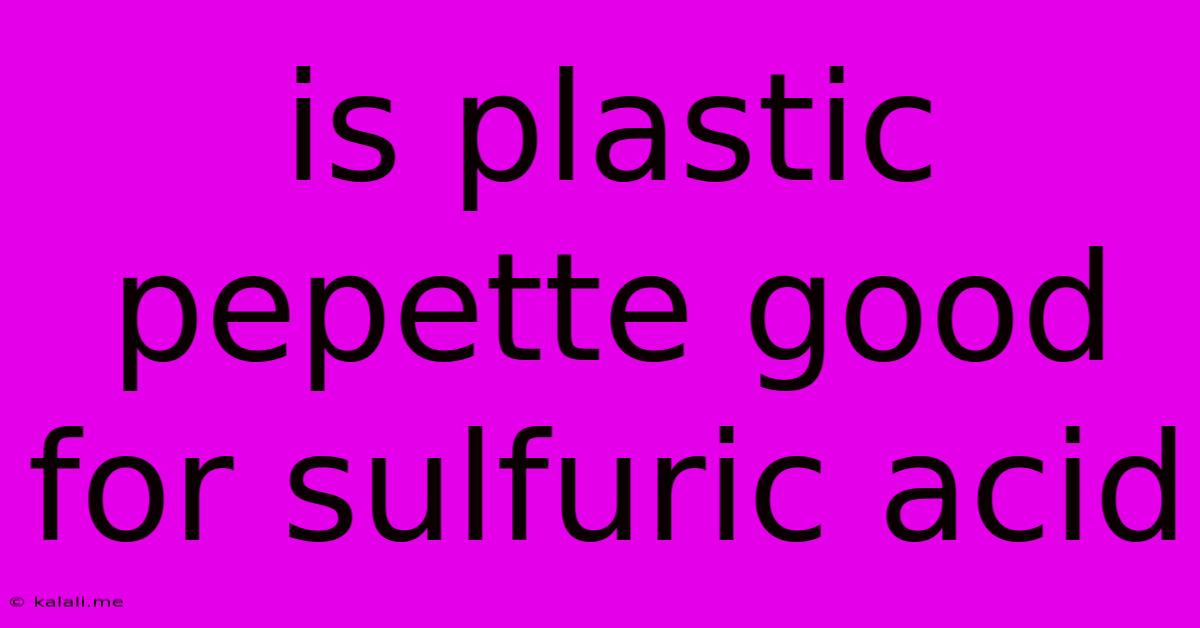Is Plastic Pepette Good For Sulfuric Acid
Kalali
May 23, 2025 · 3 min read

Table of Contents
Is a Plastic Pasteur Pipette Good for Sulfuric Acid? A Comprehensive Guide
Meta Description: Learn whether plastic Pasteur pipettes are suitable for handling sulfuric acid. This guide explores the chemical resistance of common pipette materials and offers safer alternatives for handling this corrosive substance.
Sulfuric acid is a highly corrosive and reactive substance, demanding careful handling and appropriate equipment. A common question among laboratory technicians and students revolves around the suitability of plastic Pasteur pipettes for dispensing this dangerous chemical. The short answer is: generally, no. While some plastics might offer some resistance, the risks associated with using a standard plastic pipette for sulfuric acid significantly outweigh any perceived convenience. Let's delve deeper into why.
Understanding the Corrosive Nature of Sulfuric Acid
Sulfuric acid (H₂SO₄) is a strong mineral acid known for its high reactivity and corrosive properties. It readily attacks many materials, including metals and some plastics. Its corrosive nature stems from its ability to dehydrate substances, leading to chemical breakdown and damage. This is especially true at higher concentrations.
Material Compatibility: A Closer Look at Plastics
Pasteur pipettes are often made from various plastics, including:
- Polyethylene (PE): While relatively resistant to many chemicals, concentrated sulfuric acid can degrade PE over time, potentially leading to leaks and exposure.
- Polypropylene (PP): PP generally shows better chemical resistance than PE. However, prolonged exposure to concentrated sulfuric acid can still cause degradation and embrittlement.
- Polystyrene (PS): PS offers poor resistance to sulfuric acid and is not suitable for handling this substance.
It's crucial to understand that even plastics advertised as "chemical resistant" might not withstand the corrosive power of concentrated sulfuric acid indefinitely. The duration of contact, temperature, and the acid's concentration all play crucial roles in the degradation process.
The Risks of Using Plastic Pipettes with Sulfuric Acid
Using a plastic pipette with sulfuric acid poses several significant risks:
- Chemical Degradation: The acid can degrade the plastic, leading to cracks, leaks, and spills, resulting in exposure risks.
- Contamination: The degraded plastic can contaminate the acid, potentially affecting experiments or reactions.
- Personal Safety Hazard: Spills or leaks can cause serious chemical burns and injuries.
Safer Alternatives for Handling Sulfuric Acid
Given the inherent risks, using appropriate and specialized equipment for handling sulfuric acid is paramount. Safer alternatives include:
- Glass Pipettes: Borosilicate glass pipettes offer superior chemical resistance and are generally suitable for handling sulfuric acid, provided appropriate safety precautions are taken.
- Specialized Plasticware: Some specialized plastics, such as certain fluoropolymers (like PTFE or PFA), exhibit excellent resistance to sulfuric acid. However, these are typically more expensive and may not be readily available as standard Pasteur pipettes.
- Automatic Dispensers: For larger volumes or frequent dispensing, automatic dispensers or burettes are preferable, reducing the risk of manual handling and spills.
Always remember to prioritize safety when working with hazardous chemicals. Consult safety data sheets (SDS) for specific guidance on handling and storage, and always wear appropriate personal protective equipment (PPE), including gloves, goggles, and lab coats.
Conclusion
While some plastics might offer temporary resistance to dilute sulfuric acid, using a standard plastic Pasteur pipette for concentrated sulfuric acid is strongly discouraged. The potential for chemical degradation, contamination, and personal injury outweighs any convenience. Prioritize safety by utilizing more suitable alternatives like glass pipettes or specialized plasticware designed for corrosive chemicals. Remember to always consult safety data sheets and employ appropriate safety measures when handling sulfuric acid.
Latest Posts
Latest Posts
-
Power Up Radio Transmitter Fallout 4
May 24, 2025
-
Getting Flowers 2 Days Before Giving Them
May 24, 2025
-
Pass Argument Ti A Function In Ksh
May 24, 2025
-
How Old Was Harry When His Parents Died
May 24, 2025
-
100 Amp Sub Panel Wiring Diagram
May 24, 2025
Related Post
Thank you for visiting our website which covers about Is Plastic Pepette Good For Sulfuric Acid . We hope the information provided has been useful to you. Feel free to contact us if you have any questions or need further assistance. See you next time and don't miss to bookmark.